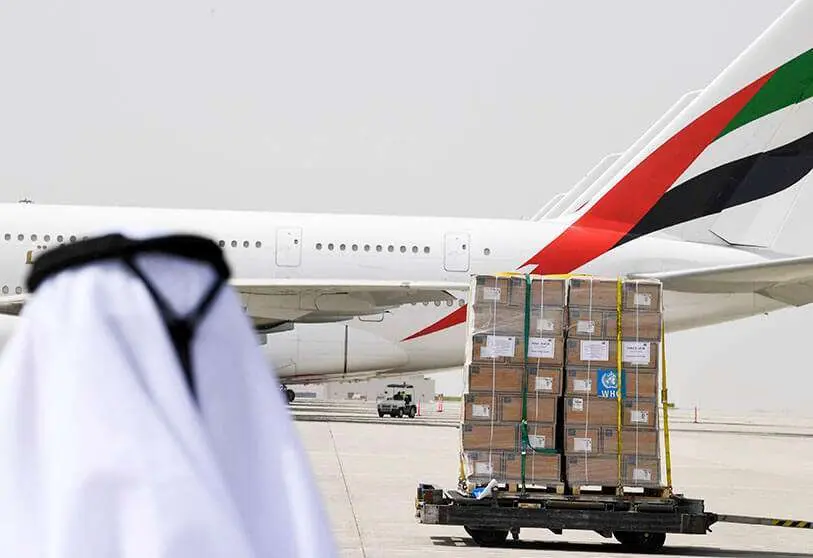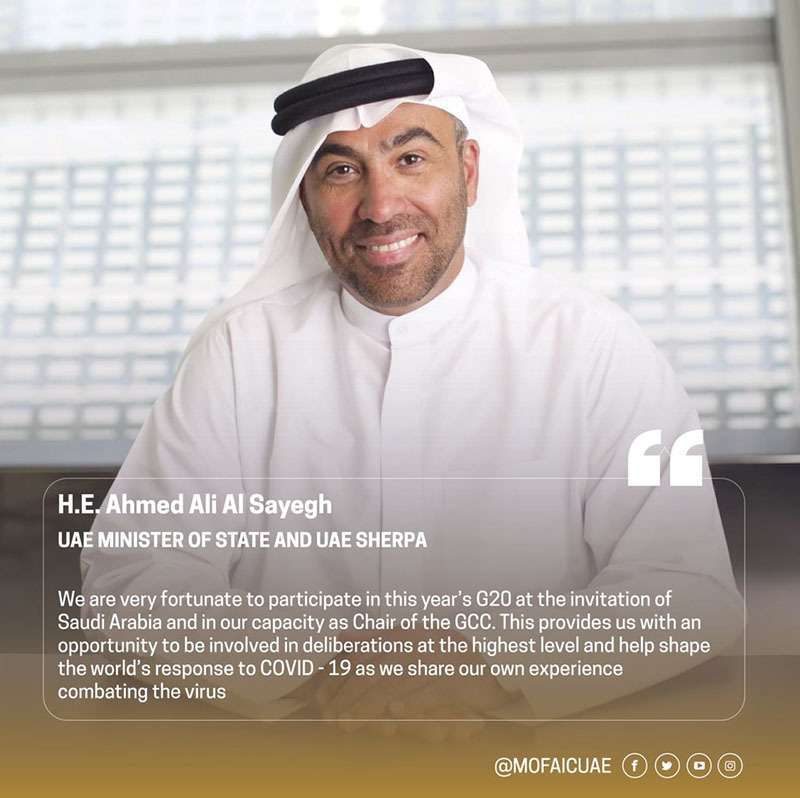Emirates participates in G20 meetings at the height of the COVID-19 pandemic crisis

As governments around the world intensify their efforts to combat the COVID-19 pandemic and neutralise the negative impact of this crisis on people and economies, international cooperation has become more necessary than ever before. Accordingly, the role of the G20 as the only forum that brings together some of the key international organisations involved in acting against the virus, including the World Health Organisation and the United Nations, alongside the world's largest and most advanced economic powers, to which we must add their financial, technological and strategic potential, which is capable of helping the world overcome this difficult crisis.
The G20, after the financial crisis of 2008, has been transformed from a mere meeting of finance ministers of the member states to a high-level summit that brings heads of government together, and is now acting to demonstrate its effectiveness in the face of its greatest challenge since its constitution. The group brings together not only world leaders, but also central bank governors and ministers of foreign affairs, education, health, agriculture, finance, environment, energy, tourism, the digital economy, trade and anti-corruption. And the fact that this group represents 75% of world trade and one third of the world's population means that it is well placed to use its resources in the fight against COVID-19 and avoid its dire consequences.
With this in mind, the Kingdom of Saudi Arabia, which is chairing the G20 this year, convened an extraordinary online summit at the end of March, during which the heads of state demonstrated their willingness to adapt to the challenges and guarantee the key role of this group, as well as maintaining their commitment to meet again whenever necessary, which indicates to the whole world that the members of the G20 are aware of the seriousness of this crisis and that they are ready to help.
In the statement issued after the online summit, the G20 leaders recognised the need for coordinated action in overcoming the consequences of the COVID-19 pandemic, and agreed on a number of joint initiatives in the areas of health, economic policy and international trade. They have committed to work together to secure resources to support the WHO's COVID-19 Solidarity Response Fund, the Coalition for Epidemic Preparedness and Innovation (CEPI) and the Vaccine Alliance (Gavi). At the same time, they have asked WHO to consider establishing a global initiative on pandemic control. As a result of these commitments, Saudi Arabia, out of a sense of responsibility, has decided to dedicate $500 million to support these institutions and other regional and international organisations in order to strengthen their efforts to combat the COVID-19 pandemic.
The United Arab Emirates (UAE) attended this extraordinary online G20 summit. We have been fortunate to be able to participate in this year's summit, in accordance with an invitation from the Kingdom of Saudi Arabia, also because the UAE is the current chair of the GCC Council, which has facilitated our participation at the highest level to contribute to the fight against the COVID-19 pandemic.

As His Highness Sheikh Mohamed bin Zayed Al Nahyan, Crown Prince of Abu Dhabi and Deputy Supreme Commander of the UAE Armed Forces, recently commented, many developing countries do not have access to the same level of medical care or preventive measures available to rich industrialised nations to protect themselves from the virus. African countries are in dire need of our attention and therefore it is appropriate to postpone economic development in favour of the need to protect humanity and save lives when a crisis erupts.
The UAE was one of the first countries to reach out to support and help other states in the fight against the coronavirus crisis. The UAE has donated more than 270 tonnes of aid to 25 countries and has helped to support more than 270,000 health workers. These countries are Italy, Afghanistan, Iran, China, Serbia, Croatia, Malaysia, Greece, Ethiopia, Colombia, Sudan, Cyprus and the Seychelles. I also had a meeting with Bulgaria's Minister of Economy, Emil Karanikolov, to discuss bilateral cooperation between the UAE and Bulgaria, in light of the challenges of the COVID-19 pandemic.
The UAE had managed, as of 19 April, to carry out 86 ground and air evacuations to repatriate 2286 citizens, residents and their accompanying persons to the UAE, as well as to repatriate 22,900 foreigners to their countries of origin, including repatriation from the Chinese city of Wuhan of citizens of friendly and fraternal countries before accommodating these citizens in the Humanitarian City of Abu Dhabi. The UAE also repatriated South Koreans and their companions from Iran and received two planes from the United Kingdom with 400 students of different nationalities.
All these efforts have not prevented the UAE from acting on a national level to combat the pandemic as well. During the first days of the crisis, we commissioned a rapid response team to deal with any suspicious cases. Schools, universities and kindergartens were closed. Distance learning has been activated. We have imposed travel restrictions on Emirati citizens and all new visas have been suspended. These measures have been tightened up to the point where all incoming and outgoing flights have been suspended. These innovative measures have been accompanied by night-time disinfection operations throughout the country. COVID-19 diagnostic tests have been carried out on the passengers of drive-through vehicles. The UAE has been at the forefront of testing for the virus, conducting more than 765,000 tests. Dubai Emirates, one of the world's largest airlines, became the first airline to conduct rapid tests of COVID-19 on passengers, with results available within ten minutes.
As a guest at this year's G20 summit, the UAE is contributing to the response to the crisis through measures taken at the national level. For example, it provided a US$70 billion stimulus package on 5 April 2020 to ensure the liquidity of the banking system in its fight against the pandemic, a move that coincides with the commitment of G20 leaders to inject more than US$5 trillion into the global economy.
At the same time, and in accordance with the agreement of the G20 leaders at the extraordinary online summit, the relevant G20 ministers have continued to convene meetings in parallel with those of the relevant task forces in order to seek solutions to combat this crisis. Recent G20 activities have included meetings of finance, health and agriculture ministers, in addition to the infrastructure group and the international team dealing with financial structuring. And finally, as one of the world's major logistics centres, the UAE has managed to maintain domestic maritime and air freight transport in order to maintain the flow of imports and exports, as well as international humanitarian aid. All these measures are in line with the commitment of the G20 trade and investment ministers to maintain fluid logistics networks and to facilitate the circulation of health care workers and traders across borders.
The UAE has always advocated concerted efforts and multilateralism in seeking solutions to global issues. We believe that the potential of this approach has become stronger than ever today, particularly as the world faces, as UN Secretary-General Antonio Guterres has pointed out, the most challenging crisis since World War II.
We must work together to make our citizens aware of the risks involved in this pandemic, offering the hope that a satisfactory solution can be found soon. Until that happens, we need to know that the more coordinated and rigorous our response, the better the outcome for everyone.

Ahmed Ali Al Sayegh is Minister of State, Government of the United Arab Emirates
Source: Ministry of Foreign Affairs of the United Arab Emirates
